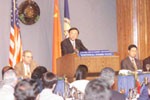 |
Chinese Ambassador on Sino-US Ties in New Century

Chinese Ambassador on Sino-US Ties in New Century
China-US relations could be advanced to "a new high" in the 21st century so long as the two countries adhere to principles enshrined in the three joint communiques and work together "in a constructive and cooperative spirit," Chinese Ambassador Yang Jiechi said.
Ambassador Yang, in a luncheon speech at the National Press Club here on Tuesday, said that although the relationship between the two countries experienced "some difficulties" in the past six months, "both the Chinese and American sides have expressed desire to improve ties, and have taken concrete steps, resulting in an obviously improved situation."
He described the telephone conversation between President Jiang Zemin and President Bush earlier this month as "of major significance," and added that it should serve as a guidance for further improving bilateral ties in the days to come.
Yang made the remarks just on the eve of the first rendezvous between Chinese Foreign Minister Tang Jiaxuan and U.S. Secretary of State Colin Powell in Hanoi. The two leaders met at the ARF Foreign Ministers' meeting on Wednesday. Powell will also pay a visit to China on Saturday and Sunday.
Powell's meetings and talks with the Chinese side "will enhance mutual understanding, further improve the atmosphere of bilateral relations and, more importantly, pave the way for the summit between President Jiang and President Bush at the Informal APEC leadership Meeting in Shanghai in late October this year, and President Bush's subsequent visit to China," Yang said.
The summit and the visit, he added, will become "the highlight of China-U.S. relations this year," "setting the course for future development of bilateral relations in the new century."
Yang said that China and the United States "have a great deal of important common interests" and share a common responsibility of promoting peace, stability and prosperity in the Asia-Pacific region and the world as a whole.
The ambassador noted that Chinese students studying in the United States has reached 120,000 since 1978, while the number of American students studying in China exceed 10,000. And U.S. export to China has been growing rapidly, with an average annual rate of 16 percent in the last decade.
According to Chinese statistics, two-way trade volume between China and the United States reached 30.4 billion dollars during the first five months of this year, with U.S. export to China climbing by 20.9 percent, rising faster than its import from China. And U.S. direct investment in China now stands at 30 billion dollars and more.
While East Asia is confronted with new economic challenges and troubles, statistics show that export to China from many countries surged by more than 20 percent in 2000 and then 10 percent during the first quarter of this year. "Nowadays, many countries in the area have come to regard China as one of their leading foreign markets," Yang said.
He noted that from this August 1 onward, China will gradually remove price controls on 128 items, leaving only 13 in the hands of the government, and China is expected to import 1.4 trillion worth of goods and technologies in the next five years.
"All this will provide abundant business opportunities for the Asia-Pacific region and for China-U.S. cooperation," he said.
Yang also noted that the two countries share a stack on security issues in the Asia-Pacific region. "The ongoing ARF meeting is another forum where we can deepen our cooperation" and "China is willing to have dialogue with all the countries in the region including the U.S. and carry out productive cooperation with them," he said.
Yang reaffirmed China's approach toward the Taiwan question, " the issue of biggest concern" to Beijing in Sino-U.S. relations. The question, he stressed, if not properly handled, will cause " serious harm" to ties between the two countries, "because it is an issue that touches the sentiments of the 1.3 billion Chinese People and bears on China's sovereignty, territorial integrity and national reunification."
He pointed out that over the years, the U.S. administrations, both Republican and Democratic, have all undertaken to abide by the principles enshrined in the three China-U.S. Joint Communiques and pursue a one China policy. "We hope that the U.S. side will fulfill its commitments in deeds," he emphasized.
"I am convinced that a prosperous and reunited China also serves U.S. interests, as it will enhance peace, security and stability in the Asia-Pacific region and the world at large. I believe more Americans will see things that way," Yang said.

In This Section

|